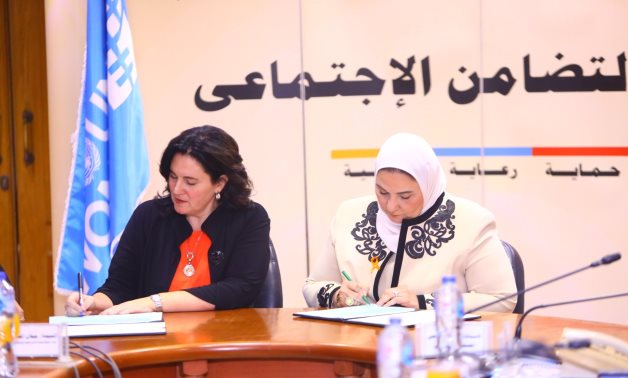
Minister of Social Solidarity Nevine al-Qabaj and Representative of UN Women Kristen Arab signing cooperation agreement on care economy. Cairo, Egypt, December 15, 2022. Press Photo
CAIRO – 15 December 2022: Within Egypt's 16 Days of Activism to Combat Violence Against Women campaign, the Ministry of Social Solidarity and UN Women signed Thursday a cooperation agreement to increase investments in care economy with the aim of enlarging women's participation in the workforce.

The agreement's goal is enhancing the capabilities of the ministry to assess the shortage in the care economy, and estimate size of investments needed and economic return in order to promote awareness on investment opportunities in the sector.
The partnership also entails providing capacity-building to centers that offer services to working women, and raising the awareness of women in care economy on their social and economic rights as well as the national mechanisms available to acquire support.
Minister Nevine al-Qabaj pointed out that the move is also aimed at helping women with household chores, which are typically unpaid, by offering the services of female workers who can assume such tasks in high quality and affordable costs.
The minister added that the size of unpaid labor carried out by women amounts to 30 percent of Egypt's GDP. That is why care economy is considered a productive field that creates job opportunities for women in the areas of education, nursing, child care, aged care, disability care, and household chores.
Representative of UN Women Kristen Arab pointed out that women in Egypt attain good levels of education. Nonetheless, that has not translated into high participation in the workforce, and that is mostly because they have to strike a balance between their work and families.
Arab elaborated that the availability of care services would better enable women to join the labor market, and that according to a study conducted by UN Women and the Economic Research Forum (ERF), care economy, already female-dominant, is growing the most in the private sector.
Comments
Leave a Comment